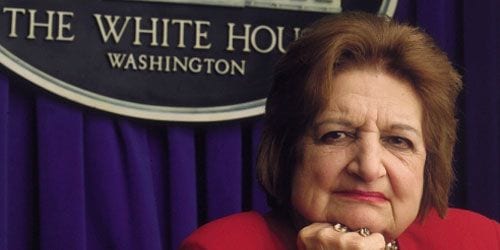
All presidents hate us, so you start from there.
— Helen Thomas
“I think that presidents deserve to be questioned, maybe irreverently most of the time. Bring ’em down to size.” Helen Thomas knows whereof she speaks. The longtime White House correspondent for United Press International, Thomas has covered nine presidents (“Only nine,” she smiles), and has made it her business to question every one of them, often irreverently.
In Rory (Ghosts of Abu Ghraib) Kennedy’s Thank You, Mr. President: Helen Thomas at the White House, airing 18 August on HBO, Thomas recalls her many years on “body watch” — the term White House correspondents use when the president is their beat. Tart and astute, her narration is accompanied a terrific selection of archival imagery, still and moving, the film using her remarkable career to track the shifting relationship between the press corps and the president, as well as how this relationship is shaped by and affects broader social contexts. As Thomas remembers, “When I started covering the White House, all doors were closed really for women in our profession,” you see her in black and white photos, eyes on her notepad, pressed up against John Kennedy or President Johnson, surrounded by male colleagues and competitors. Repeatedly, Thomas appears asking informed, intelligent questions, the sorts of questions you’d ask if you had the chance.
Even as she became known for asking hardball questions (to Bush 43: “Your decision to invade Iraq has caused the deaths of thousands of Americans and Iraqis. Every reason given has turned out not to be true. My question is” why did you really want to go to war?”), Thomas was also, the film reminds you, breaking social and political ground. She recalls the “game” the press corps had to play with LBJ, as he had the corps follow him as he walked (with beagles) and talked on the South Lawn. “And those were the days,” she says, “when we wore high heels and pointed toes, so those were agonizing, ’cause we’d walk round and round… He’d be speaking almost in a whisper. I thought it was sadistic, because you could hardly hear what he was saying.”
Johnson is also Thomas’ segueway to the very brief account of her marriage to Doug Cornell, whom she met on the job (he was the correspondent for AP when she wrote for UPI). Cornell, it seems, is the guy who wrote up the moment that the president picked up his beagle by the ears, leading to public outrage at his cruelty; the image and the story became iconic, especially as the administration contended with one failure after another in Vietnam, as well as a increasingly resistant press and impatient public.
Thomas suggests that the White House press corps is responsible to that public. “The presidential news conference,” she asserts, “is the only forum, the only institution in our society where a president can be questioned.” Here she is famously relentless, though, she also notes, “Access to a president doesn’t mean you’re gonna get the truth.” She laments that body watch doesn’t allow time for “investigative journalism,” during her discussion of Nixon and Watergate. “We really realized that all these terrible things were going on, betrayal of the government, abuse of power, and so forth, and we had not really done anything about it,” she says, “And it took two outside reporters, Bob Woodward and Carl Bernstein, to really expose all of these things — and there we were.”
Such failure to act — to probe, to push, to ask questions — still bothers Thomas. “I feel that the press really laid down on the job,” she says of the Iraq War. “They let the country down, they defaulted when they should have been asking the tough questions.” Asked by Kennedy from off-screen if she thinks the press has a liberal bias, Thomas laughs out loud. “Hell no! I’m dying to find another liberal: open their mouths! Where are they?” Thomas worries that presidents have become less accessible. Even if, she says, the early “gentlemen’s agreement” protected presidents’ private lives (shots of Kennedy illustrate this point) and today “It’s no holds barred,” the information reporters seek is increasingly trivial. Though she understands the security reasons for keeping the press from the president (no more walks ’round the South Lawn), Thomas also condemning the secrecy and control now assumed by the White House. The press, she says, has “a duty to try to find out what’s going on behind the scenes.”
Precisely because of her determination to ask unscripted questions, Thomas was deemed “persona no grata” early on in the current Bush Administration, rarely called on during news conferences. She has lately given up on her former sense of mission (“The whole thesis of a wire service is ‘Just the facts, ma’am,'” she says, “I refrained from even using a verb I thought might slant copy or show a bias”), spurred on by her decision to leave UPI when the Reverend Moon bought it. Now, she’s writing columns, enjoying the opportunity to speak her mind in print (she has notably called George W. Bush “the worst president in American history,” earning still more aversion by the president’s press representatives: the film offers a bit of entertaining hurly-burly with Dana Perino).
Smart, charming, and brief (at 38 minutes), Thank You, Mr. President is also resonant. Its argument regarding the increasingly imperial American presidency has everything to do with the ways journalists, networks, and newspapers are treating George Bush and both his potential replacements. “Nothing that can replace being there for a reporter,” Thomas asserts. True, but nothing can replace being ready and willing to “ask the tough questions,” either.

![Call for Papers: All Things Reconsidered [MUSIC] May-August 2024](https://www.popmatters.com/wp-content/uploads/2024/04/all-things-reconsidered-call-music-may-2024-720x380.jpg)



